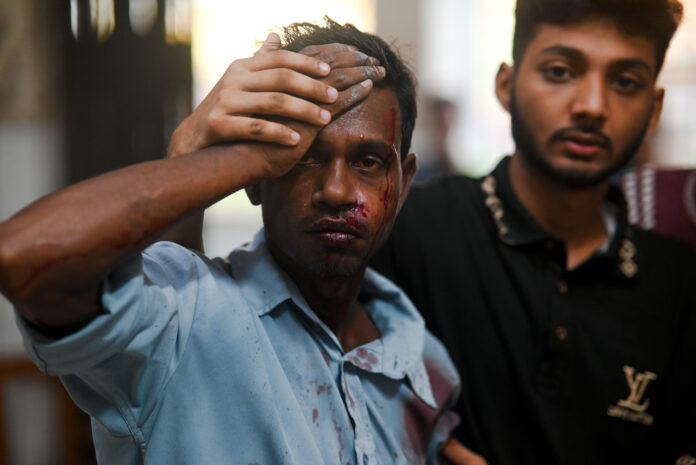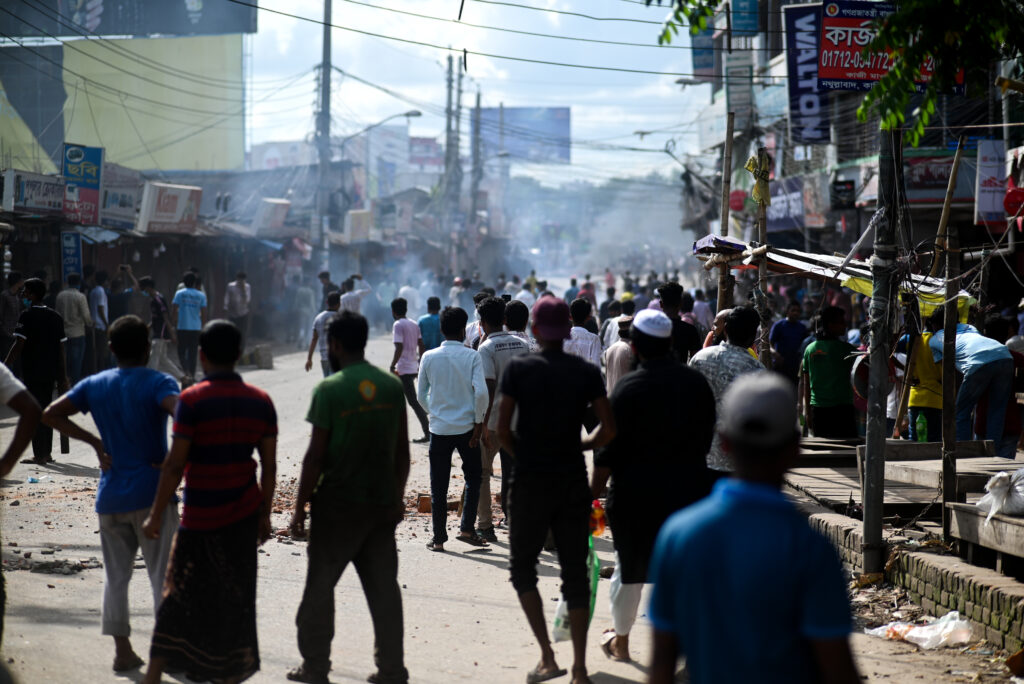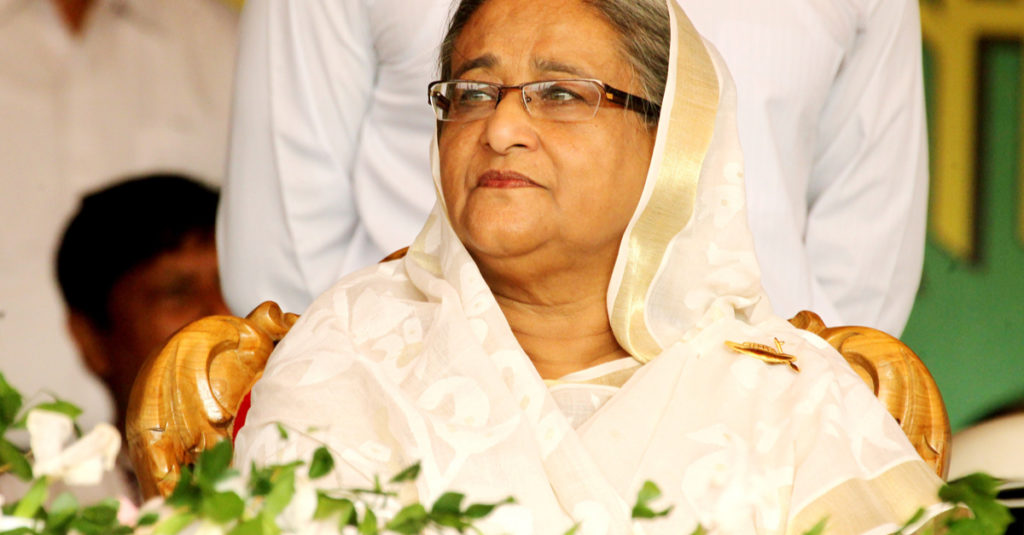
Lal Miah says the deadly unrest in Bangladesh at the moment is the result of government mismanagement, corruption and repression.
Recent news regarding the Student Quota Reform protests in Bangladesh, which have resulted in over 100 people being killed and thousands injured, have highlighted the government’s brutal crackdown on dissidence.
On July 19th the regime deployed the military with the provision to enforce article 144 of the Bangladesh constitution which prohibits the assembly of five or more people, holding of public meetings, and the carrying of firearms.
This article can be invoked for up to two months and such provisions are brought forward only in cases of martial law or national emergency.
While the global media has brought to attention the economic problems which have caused these protests, it is also important to properly understand the Quota system in place, the motivation of the government to maintain the status quo, and finally the demands of the students risking their safety on the streets.
The Quota System
First, it is important to understand the structure of the quota system in place.
Subscribe to our newsletter and stay updated on the latest news and updates from around the Muslim world!
The system exists as a means of “affirmative action” to aid the employment and education of under-represented and underprivileged members of society. It applies to both government sector jobs as well as private sector ones.
One percent of all available seats within the public sector and vocational institutions are to be given to applicants with disabilities, 5% to ethnic minorities, 10% to districts, 10% to women applicants, and most importantly 30% to the children and grandchildren of freedom fighters who took part in the Liberation War of 1971 against Pakistan.
So in total 54% of seats are reserved under the quotas, but the 30% quota for freedom fighters and their off-spring have been of particular controversy.
‘Freedom fighter quota’
In 2018 following intense protests the government revoked the quota system completely but on July 10, 2024 the High Court declared the removal of the system as unlawful and reinstated it.
The 30% quota for the off-spring of freedom fighters is controversial due to a series of issues. It is important to note that the controversy is not caused by the freedom fighters themselves, and many veterans have spoken in favour of the reforms stating that the 30% entitlement is disproportionate and that merit should be prioritised instead of familial affiliations.
Most Bangladeshis also respect the freedom fighters and see independence as a necessity. While there are detractors who say otherwise, the near universal consensus among Bangladeshis of all walks of life is that the freedom fighters were an integral part in the creation of the country and freedom from tyranny.

While the disproportionate representation is controversial in itself there is further resentment caused by recent scandals regarding freedom fighter recognition. Certificates are provided to freedom fighters in order to recognise their contribution to the war effort in 1971, but over the decades this has been weaponised through certificate frauds which at times took place with the help of ruling party members.
A national daily in 2016 stated that there are 1,000s of fake freedom fighters and this was made possible as certificates were very easy to forge or were signed by employees and staff of the Ministry of Liberation War Affairs and Muktijoddha Sangsad (the welfare association of combatants).
One particular case was of the Prime Minister’s cousin and Member of Parliament Abul Hasanat Abdullah. In a 2002 raid by the army on his residence, they uncovered 355 blank freedom fighter certificates.
While this is certainly a point of contention for many, students in particular have it difficult as the youth unemployment rate in the country is at 12%, and a staggering number more are under-employed in a country with high inflation and low salaries.
For many government service is a potential means to have a well-paying job so the quota makes this particularly difficult.
Government motivations
However, the second trigger for the protests came when Prime Minister Sheikh Hasina on July 14th stated: “Why do they [the protesters] have so much resentment towards the freedom fighters? If the grandchildren of the freedom fighters don’t get quota benefits, should the grandchildren of Razakars (Pakistani collaborators) get the benefit?”
The resentment for the razakars runs rampant among the Bangladeshi public as these were traitors and collaborators who worked with the Pakistani army in 1971. This inflamed the public to call for further actions and in particular mobilised more students to protest.
Given the support of the freedom fighters and many other groups who call for a reform of the quota, it is surprising that the government would take such a heavy handed approach. So to understand the government’s actions it is important to understand their motive – bureaucracy, education and other public sectors are a key means for it to stay in power.

The misuse of freedom fighter certificates has been a key means for the government to install its loyalists; particularly from its youth wing (Jubo League) and student wing (Chhatro League), to positions of power in order to suppress any opposition to the regime.
This was made glaringly obvious not only over the years with the increase in pro-Awami League public sector workers but in particular by a recent revelation. Sayed Abed Ali a former chauffeur for the Public Service Commissoin (PSC) was recently arrested with his ill-gotten wealth. He was charged with leaking public examination papers to people for money.
The scandal brought to light the misdeeds and malpractices of the organisation and several more officers were later held for questioning. This showed that the playing field was far more skewed than previously expected.
The skewed playing field, and the unfair quota system have been a major instigator with comments made by ministers, and in particular the Prime Minister, being a catalyst for mass protests across the country. The potential loss in controlling the bureaucracy led to the government brutally cracking down on students using the Jubo League, Chhatra League and police.
Student demands
Due to the sheer scale of the protests the government have resorted to deploying the military. As a result the protesters have brought forward a 9 point demand to the government which are as follows:
- The Prime Minister must apologise to the nation for the killing of students.
- The resignation of the Home Minister Asaduzzaman Khan Kamal and Road Transport and Bridges Minister Obaidul Quader.
- Dismissal of the Deputy Inspector General (DIG), Police Commissioner and Superintendent of Police in areas where students were killed,
- The resignation of the Vice-chancellors of Dhaka University, Jahangirnagar University, and Rajshahi University.
- Arrest and prosecution of police officers and ruling party thugs accused of student killings.
- The families of the grieving and the injured should be compensated.
- Prohibition of partisan student politics on all campuses.
- All schools, colleges, universities, and student halls should be opened up again for students.
- Guarantee that a student’s participation in the protest does not cause any harm to their academic future,
The demands are high from the students which indicates further escalations in violence and repression over time, or a fast forwarding of negotiations. The dire situation currently being witnessed in Bangladesh is not the result of just recent events alone but instead a decade and a half of government mismanagement, corruption and repression culminating in a rebellious spirit across the citizenry.






















